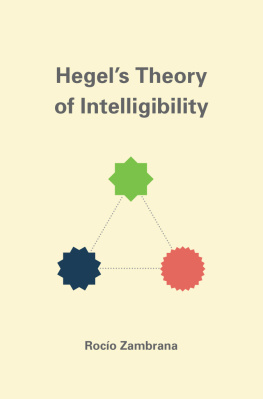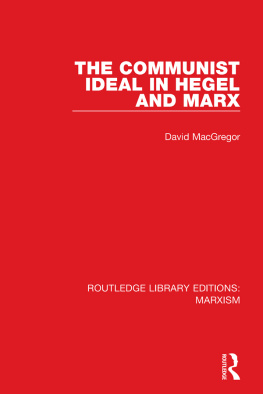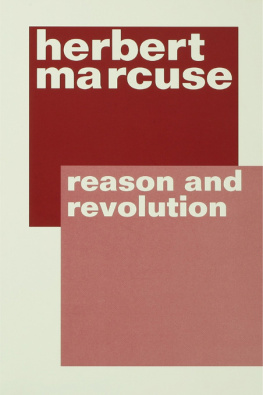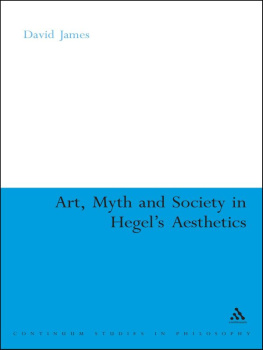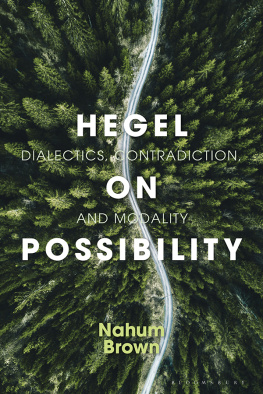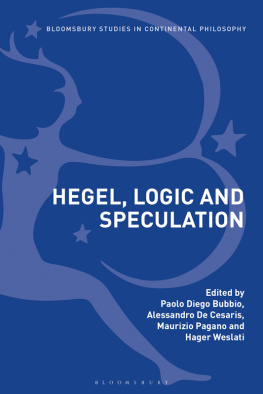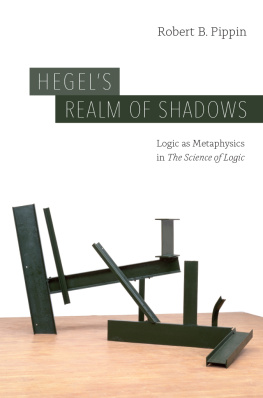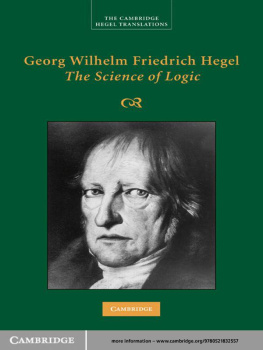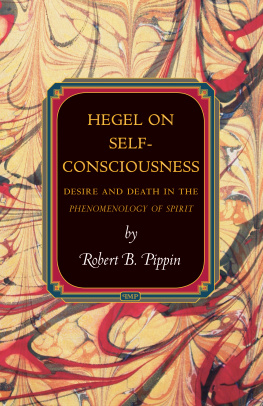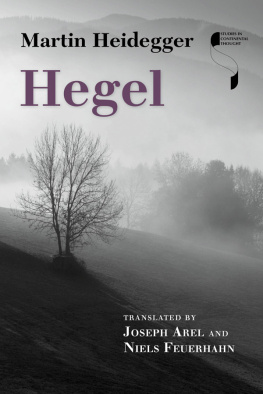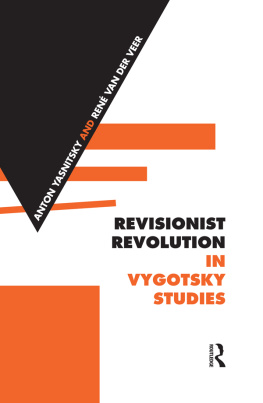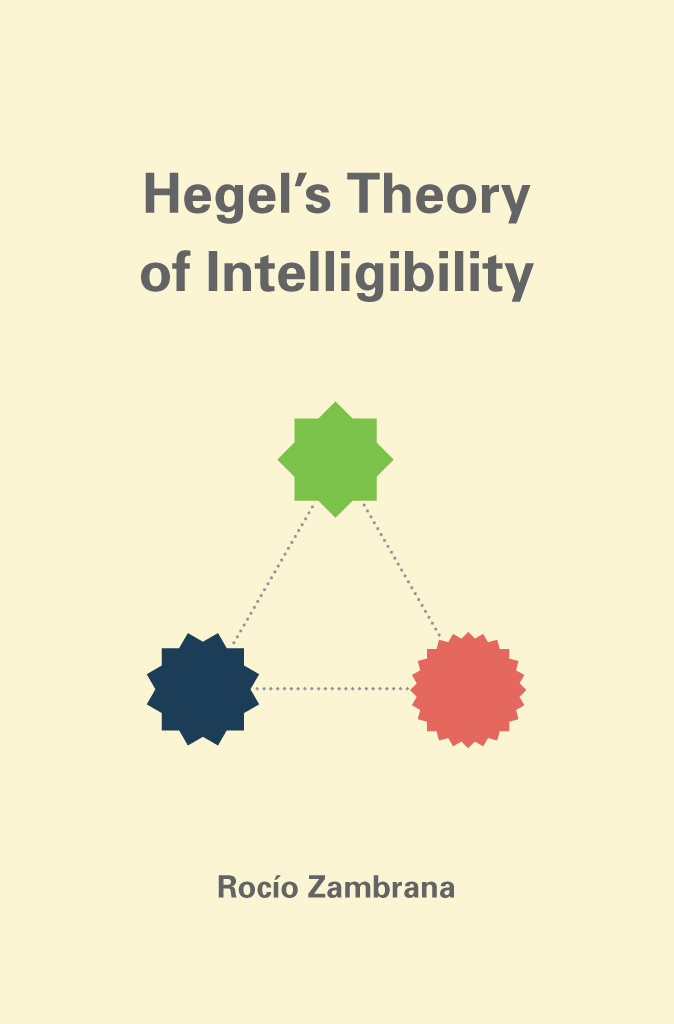All rights reserved. Published 2015.
Zambrana, Roco, author.
Hegels theory of intelligibility / Roco Zambrana.
Includes index.
ISBN 978-0-226-28011-0 (cloth : alk. paper) ISBN 978-0-226-28025-7 (ebook) 1. Hegel, Georg Wilhelm Friedrich, 17701831. Wissenschaft der Logik. 2. Normativity (Ethics). 3. Philosophy, German19th century. I. Title.
B 2942. Z 7 Z 36 2015
This paper meets the requirements of ANSI/NISO Z 39.48-1992 (Permanence of Paper).
My gratitude extends above all to Jay Bernstein. Jays lectures on Hegels Phenomenology of Spirit at the New School for Social Research were formative for my thinking at every level. His support, guidance, and intellectual energy have been vital during and beyond my time at the New School. Richard J. Bernsteins philosophical pluralism and Socratic spirit continue to inspire me, and his encouragement continues to support me. I am also deeply grateful.
If Jays lectures opened up a philosophical universe for me, the late Gillian Rose, Angelica Nuzzo, Karin de Boer, and Rebecca Comays work made me dream of writing this book. Angelica, Karin, and Rebecca offered incisive comments on my work. A philosophical friendship with Martin Hgglund around Hegel and Derrida was decisive for my views about Hegels Logic. Conversations about Hegel with Karen Ng and Mara del Rosario Acosta have been seminal. Discussions about Kant, Fichte, and Hegel with Robert Pippin and Clinton Tolley in the context of the Master Class on Post-Kantian Idealism generously funded by the Journal of the History of Philosophy were important for the argument I offer in . Dean Moyars insightful comments were also important for the book as a whole. To all, I am profoundly indebted.
My colleagues in the Philosophy Department at the University of Oregon provide a rich intellectual environment and have offered encouragement without fail. Colin Koopmans intellectual friendship is invaluable. Conversations with Alejandro Vallega about decolonial thought always expand my thinking. Bonnie Mann and Scott Pratts support, as well as Beata Starwaskas, have been vital. Matt Jacobs and Brock Baines became important interlocutors as I wrote this book. Brocks comments on the manuscript and work on its final version were extremely helpful. I am also grateful.
Without Fanny Sderbck, Anita Chari, Matt Condgon, Michael Allan, and Michael Salters love, care, and brilliance this book would not have been written. I owe a special debt to Fanny, who has been my unfailing sister in a journey that began in but extends way beyond philosophy. As an undergraduate student at the University of Puerto Rico, Anayra Santory Jorge taught me the power and value of philosophy. Her philosophical-political insight continues to inspire me. Katie Terezakis offered support and encouragement upon my arrival in New York City. She paved the way within and beyond the New School. I am also deeply indebted.
Words cannot capture my gratitude to my family: Gabriela Mercado, Giancarlo Burgos, Elimari Zambrana, and Nadya Marie Garca. I traded sharing life with them on our island of contradictions for philosophy, and they supported me throughout the long stretches of silence that writing a book entail. Their patience, love, and presence have been remarkable. I am especially indebted to my mother, Nadya, whose strength is extraordinary, love unending, and friendship irreplaceable. This book is dedicated to her.
I am grateful for T. David Brents interest in the project and support of the manuscript, and to Ellen Kladky, Richard Allen, Renaldo Migaldi, and Ryo Yamaguchi for their work on the manuscript. Two readers for the University of Chicago Press provided insightful comments and suggestions. It was my great fortune to have readers who grasped the intentions of the book so deeply. The book is stronger as a result of their careful attention. Early versions of parts of chapters appeared as Hegels Hyperbolic Formalism, Bulletin of the Hegel Society of Great Britain 61 (2010); Hegels Logic of Finitude, Continental Philosophy Review 45, no. 2 (2012); and Hegels Legacy, in Continental Philosophy: What and Where Will It Be?, ed. Ted Toadvine, Southern Journal of Philosophy 50, no. 2 (2012). I thank the journals for permission to reprint the substantially revised parts that appear in this book. I also thank the University of Oregons College of Arts and Sciences for various Junior Professorship Development Awards that helped support research for this book.
WORKS BY G. W. F. HEGEL
Hegels texts are cited by volume and page number from Werke in zwanzig Bnden, ed. Eva Moldenhauer and Karl Markus Michel (Frankfurt am Main: Suhrkamp Verlag, 196970). The English translation of the Phenomenology of Spirit is cited by paragraph number. References to the Encylopaedia of Philosophical Sciences and the Philosophy of Right are cited by section number. Wherever translations have been modified, I have made a note in the text.
EG: Hegels Philosophy of Mind, Part Three of the Encyclopedia of the Philosophical Sciences (1830). Trans. W. Wallace and A. V. Miller. Oxford: Oxford University Press, 1971. Die Philosophie des Geistes. Dritter Teil, Enzyklopdie der philosophischen Wissenschaften im Grundrisse (1830). Werke in zwanzig Bnden, vol. 10.
EL: Hegels Logic, Part One of the Encyclopedia of the Philosophical Sciences (1830). Trans. William Wallace. Oxford: Clarendon Press, 1975. Wissenschaft der Logik. Erste Teil, Enzyklopdie der philosophischen Wissenschaften im Grundrisse (1830). Werke in zwanzig Bnden, vol. 8.
FK: Faith and Knowledge. Trans. Walter Cerf and H. S. Harris. Albany: State University of New York Press 1977.
GW: Glauben und Wissen. Werke in zwanzig Bnden, vol. 2.
LA: Lectures on Fine Art. Trans. T. M. Knox. Oxford: Clarendon Press, 1975. 2 vols.
PG: Phnomenologie des Geistes. Werke in zwanzig Bnden, vol. 3.
PN: Philosophy of Nature: Part Two of the Encyclopaedia of the Philosophical Sciences (1830). Trans. A. V. Miller. Oxford: Oxford University Press, 1970. Die Naturphilosophie. Zweiter Teil, Enzyklopdie der philosophischen Wissenschaften im Grundrisse (1830). Werke in zwanzig Bnden, vol. 9.
PR: Elements of the Philosophy of Right. Trans. H. B. Nisbet, ed. Allen W. Wood (Cambridge: Cambridge University Press, 1991). Grundlinien der Philosophie des Rechts. Werke in zwanzig Bnden, vol. 7.
PS: Phenomenology of Spirit. Trans. Terry Pinkard. Draft available at http://terrypinkard.weebly.com/phenomenology-of-spirit-page.html.
SL: The Science of Logic. Trans. and ed. George di Giovanni. Cambridge: Cambridge University Press, 2010.

